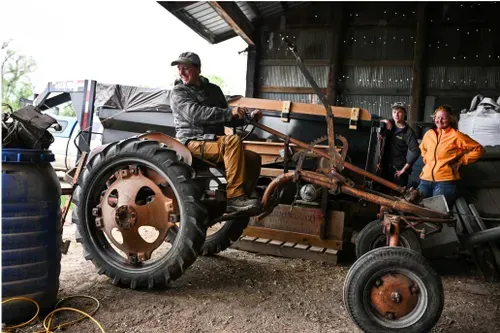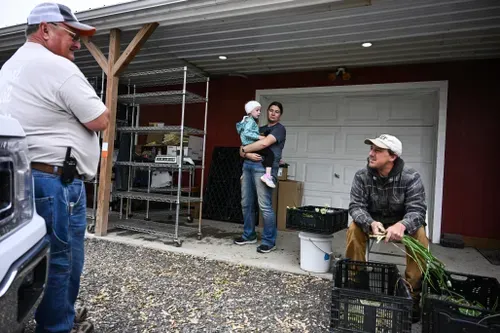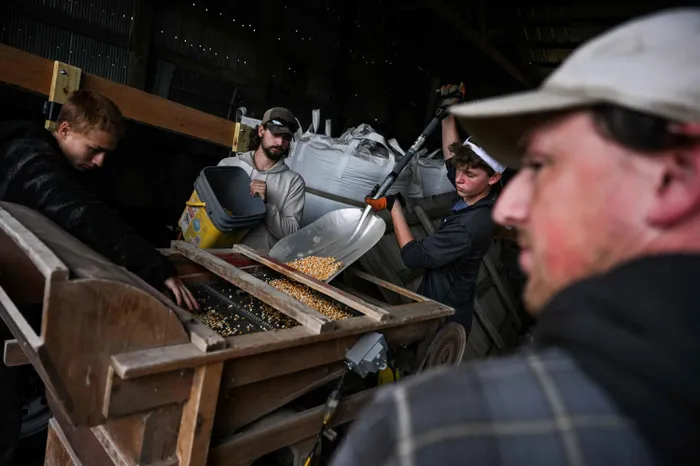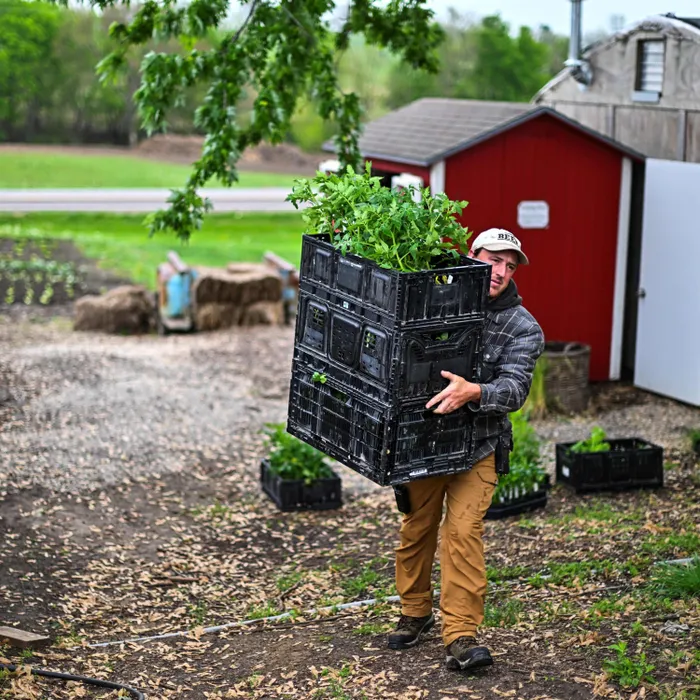A Kansas family farm, barely getting by, grapples with Trump’s cuts

Jacob Thomas moves his 1948 Allis-Chalmers tractor out of the way so farmhands Simon Peter Lowrance, center, and Josie Parsons can start cleaning corn kernels.
Image: Ricky Carioti/The Washington Post
In the dawn light at his first farmers market of the year, Jacob Thomas set out lush Bibb lettuce he’d cut just hours before, plump stalks of green and purple asparagus and coolers with 60 dozen blue and brown-speckled eggs.
Soon the downtown market would fill with customers he hadn’t seen since fall, when he and his wife, Jennifer, were making ambitious plans for the future. So much now depended on these customers. The young couple had taken a 10 percent hit when the Trump administration abruptly cut $1 billion from two programs that supplied local produce and meat to schools and food banks across the country. Robust sales here would help offset that $8,000 loss.
There have been other blows, too, which collectively have put the Thomases’ small farm operation - always just barely making it - on even shakier financial footing.
Plans for a new warehouse and an expansion of their farm store are up in the air because of the administration pausing, then unpausing a $750,000 federal agriculture grant. They plowed up a spot for a new greenhouse only to learn that another grant for $8,000 would never come. They worry that 2,000 chrysanthemum cuttings ordered from Canada will be ensnared in the countries’ tariff dispute.
A third-generation farmer, Jacob and his family are mainstays in this community near the Fort Leavenworth Army installation where they grow vegetables on 15 acres, as well as other crops - mostly hay to feed their cattle and sheep - on more than 500 acres. On their wedding day 11 years ago, he and Jennifer rode the biggest tractor they could borrow through the main street from the chapel to the reception, the bride sitting shotgun in her flowing dress.
But a decade of farming has taken a toll, and last fall Jacob began treatment for depression and anxiety. Sometimes, when the stress feels overwhelming, he can barely eat.
“The financial insecurity makes my depression worse,” he said recently. He was trying to remain optimistic, reminding himself that it was still early in the year and “just because one program went away, there’s still plenty of time to pivot.”
Though the Thomases and many of their neighbors voted for Donald Trump last November, the consequences of his administration’s wide-ranging cuts and uncertainty over tariffs have already had a profound impact on this hilly corner of northeast Kansas - one of the hardest-hit states for agriculture during Trump’s last trade war. For many, the pride they felt when the president spoke of his love for farmers in his March 6 address to Congress has given way to a growing sense of helplessness, frustration and anger.
“For every farmer I’ve talked to, this has been earth-shattering and life-changing,” said Bryan Zesiger, a winemaker and former Republican state Senate candidate who runs a tasting room just steps from the farmers market. “I don’t know what they were supposed to achieve, but from our perspective, you just hurt a lot of people.”

As Jennifer and 4-year-old Sarah look on, Jacob and his father, Dale, discuss an upcoming farmers market.
Image: Ricky Carioti/The Washington Post
As the sun rose, the first customers began trickling by the Thomases’ stand. One, an octogenarian who has known Jacob for over a decade, asked about the farm as she bought a dozen large eggs ($6) and a pound of hamburger ($7.99).
How are things going? she asked.
“Oh, it got caught up in all the grants being paused,” Jacob replied. “Now we’re trying to restart. … Fun times!”
The mayor pro tem of Leavenworth, Nancy Bauder, stopped and bought some spring onions.
“I’m glad to see you’re here,” she said. She had heard that another longtime local farmer was preparing to sell out. Jacob had heard the same, but he’s determined to keep going.

The work on the Thomases’ farm never ends, whether it's feeding the cattle or loading corn kernels into a century-old seed cleaner.
Image: Ricky Carioti/The Washington Post
Pressures and uncertainty
“C’mon, piggies!” Jacob called from the middle of a muddy pen. He and two farmhands were trying to load 23 Berkshire and Duroc pigs - some weighing over 300 pounds - into a trailer to take to the processing plant. Their bristle-haired subjects squealed, protested and slipped away from the open door.
“Dad, can you do anything about that pig or not?” Jacob asked his father, Dale, who was leaning up against the fence. Dale swatted the wayward one on its hindquarters with a stick. “C’mon, pigs, join your brethren and sistren,” Jacob urged, pushing the rest into the trailer.
It was one of the first brilliant and sunny days of spring at JET Produce and Meats, located on land that has been in the family for 70 years. The American flag on the farm store’s sign spiraled in the stiff breeze, and daughters Lisa and Sarah, ages 6 and 4, were playing nearby. Lambs dozed in their pens. Goliath, the calf Dale was bottle-feeding, cried for more milk. The rest of the cattle were scattered in an emerald field across the road.

Jacob carries plants to a trailer as he preps for a farmers market.
Image: Ricky Carioti/The Washington Post
Jacob planted his first vegetable garden while he was still in high school, but he didn’t begin raising vegetables in earnest until he was a student at Iowa State University and fell in love with horticulture. He wanted to feed people.
His wife, by contrast, was a military brat who thought she would become a chemical engineer. Jennifer mustered up the courage to ask Jacob out the day after they graduated from high school - figuring she had nothing to lose. (“I like you” was her opening line.)
The two took over principal management of the business in 2014, though Dale and his wife, Kris, remain active, with him working full-time and her managing one of the stands they have in weekend farmers markets in three nearby towns. The older couple live next door and cook dinner for the family every Friday and Sunday.
“It’s like a postcard of what it should be,” said Austin Reynolds, a fellow farmer, neighbor and friend.
The Thomases’ farm is beloved in the community, with more than 7,500 fans on its Facebook page. A recent hot debate was what to name the frog who had taken up residence in the potting shed. (Answer: Potter.)
The operation has never been very profitable, however.
“We’re barely making it,” said Jacob, 33. “Our idea of an extravagant vacation is going to Omaha to the zoo.”
He grows the food, and Jennifer, who’s 34, figures out how to market it - a puzzle she has normally been eager to solve. Yet lately the financial pressures have “gotten to the point where we don’t talk about it in front of our kids,” she said.
Before this year, Washington, D.C., felt remote, and the goings-on in the federal government during various administrations never really affected the family’s operation. Jacob considers himself a Republican but “very much dislikes Trump” and previously supported challengers like former South Carolina governor Nikki Haley. He reluctantly voted for Trump last fall, seeing him as “the lesser of two evils.”
The first big blow of 2025 came right after Trump’s inauguration, when the president issued an executive order pausing billions of dollars in federal grants, including that $750,000 award that was part of an effort to bolster resilient food systems. The new warehouse Jacob and Jennifer planned to build could have more than doubled their vegetable output and also served as a hub for smaller farmers nearby. They also hoped to expand the farm store on their property, where they sell their meats and produce, plus homemade pies, local cheese and honey from local businesses.
They later learned that the grant was reinstated, but the project remains in limbo due to rising construction costs, a disrupted building schedule and doubts over whether Jacob can secure his part of the financing.
The whole episode stung, particularly since they got little response when they asked for help from the Kansans in Congress. That included Sen. Roger Marshall, a Republican who had visited their farm on a campaign stop and surprised everyone when he pulled an onion out of the ground, wiped it on his pants and took a big bite of it. The only politician who listened was Rep. Sharice Davids, a Democrat from the Kansas City area who isn’t even their representative.
The second blow came shortly after Trump addressed Congress, asking for Americans’ patience during the “adjustment period” of tariff negotiations while predicting that “our farmers are going to have a field day right now.”
Only days later, the U.S. Department of Agriculture announced it would be axing the funding for the programs that purchased local produce, eggs and meat for the country’s schools and food pantries. In the state of Kansas alone, producers are out $2.6 million this year.
The funding last year comprised 65 percent of sales for the 30 or so farmers in the Kansas City Food Hub cooperative, who are now scrambling to find other markets. The Thomases hope to link with a new grocery store.
“Historically, if you got a government contract, we’re golden, because the government always pays,” Jacob said.
“It might take a long time, but they do pay,” Jennifer added.
“Today I don’t feel that way,” Jacob said. “For the first time in my life, I don’t trust the government is going to follow through on their word.”
The family also lost 640 acres that Jacob’s father had rented from a neighbor for 45 years when that other landowner ended the arrangement with little explanation. Jacob was so upset he couldn’t eat for two days.
“There’s a lot of truly stressful days. A lot of days. What else can happen?” Dale said as he drove with Jacob to the processing facility, the unlucky pigs jostling in the back. “When people ask how we’re doing, it’s like, ‘Do you want the truth or what we tell people?’”
Earlier in the day, father and son had gone into Leavenworth to put out the farmers market sign at the place on the downtown sidewalk where they set up on Saturdays every year.
“I can’t believe you’ve been doing this for 10 years,” Dale said.
“I thought it would be easier by now,” Jacob said.
Glimmers of good news
The market’s opening day was a success, Jacob said as he totaled up the take from the register and cash box.
They’d sold about $1,800 - “very promising,” he said - with customers purchasing dozens of $5 herbs and perennials, as well as $20 everblooming strawberry plants and $25 hanging flower baskets.
If business keeps up like this, he calculated, they might be able to make up the $8,000 hole in their budget from the loss of the USDA funding that bought food for pantries and schools.
He and Jennifer also had gotten other good news in recent days: Separate funding aimed at bringing fresh produce to a low-income housing complex in Kansas City had not been terminated as feared. Plus they’d gotten a lead on land to rent from a different neighbor who was retiring.
Still, they had barely made a dent in the 60 dozen eggs, with only eight dozen sold. Oh well, Jacob thought as he reloaded the unsold eggs in the trailer to return home. Maybe their farm store would be busy later.
Related Topics:
